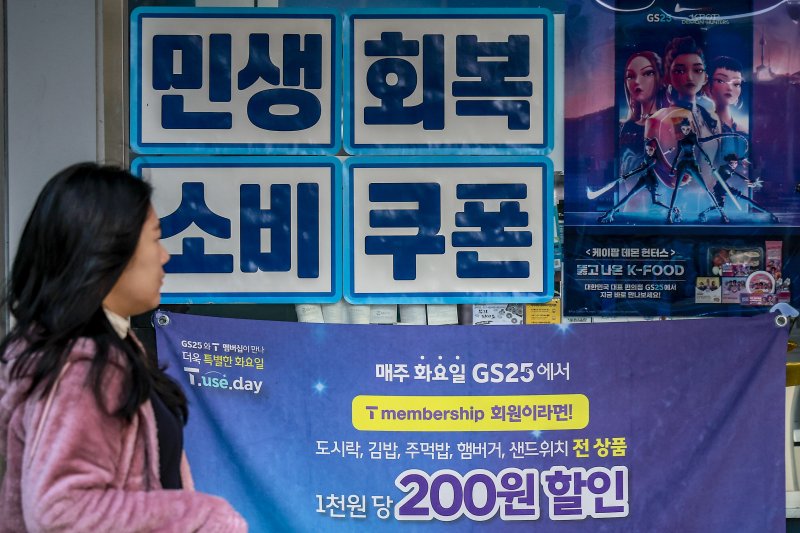KDI: "Gradual Economic Improvement Driven by Consumption"... First Upgrade in Six Months from 'Slowdown' to 'Improvement'
- Input
- 2025-11-09 13:28:50
- Updated
- 2025-11-09 13:28:50

[Financial News] The Korea Development Institute (KDI), a state-run research institute, assessed that the Korean economy is showing a gradual recovery led by consumption, despite a slowdown in construction investment and weaker export growth. For the first time in six months since May, KDI shifted its economic outlook from 'slowdown' to 'improvement,' signaling that the economy may have passed its lowest point, primarily due to the recovery in consumption.
In its 'Economic Trends for November 2025' released on the 9th, KDI stated, "Despite favorable conditions in the semiconductor sector, export growth is slowing due to the United States of America (USA) raising tariffs, and construction investment remains weak. However, the economy is showing signs of improvement, mainly driven by consumption, thanks to declining market interest rates and policies to boost spending."
Throughout the first half of this year, KDI maintained expressions such as 'economic slowdown' and 'at a weak level.' However, from August, it noted 'partial improvement in consumption conditions,' and in September, described it as 'alleviation of consumption-driven economic sluggishness.' In the November report, KDI used the term 'economic improvement' for the first time.
The government’s policy effects, such as the issuance of Consumption Coupons worth 13 trillion won and the decline in market interest rates, have helped revive consumer sentiment, making the domestic consumption-driven economic trend more pronounced.
In September, total industrial production rebounded sharply, rising 6.7% year-on-year. Both the manufacturing industry (11.6%) and the service industry (6.2%) posted gains. KDI explained that this was largely due to the Chuseok holiday shifting from September last year to October this year, resulting in four additional working days.
Production in the service industry continued to improve, especially in domestic consumption-driven sectors such as wholesale, retail, accommodation, and food services. Consumption indicators also showed a recovery trend. Retail Sales in September increased by 2.2% year-on-year, with durable goods consumption, including automobiles, surging by 22.1%. Production in accommodation and food services rose by 3.2%, supporting the recovery in service consumption.
KDI noted, "As market interest rates fall and a second round of Consumption Coupons is distributed, consumption conditions are improving, with the consumer sentiment index remaining high at 109.8."
Facility Investment in September jumped 12.8% year-on-year, a significant increase from the previous month’s -0.6%.
While investments in machinery (3.7%) and transportation equipment (40.1%) increased, KDI analyzed that this was largely due to temporary factors affecting highly volatile items such as ships and aircraft. Excluding semiconductors, imports of capital goods actually fell by 8.7%.
Despite strong performance in semiconductors, overall export growth slowed. Exports in October rose only 3.6% year-on-year, affected by fewer working days due to the Chuseok holiday. The average daily export growth rate for September and October was 3.2%, lower than August’s 5.7%. While semiconductors (18%) and ships (64.4%) performed well, automobiles (-23.2%) and steel (-7.4%) remained sluggish.
Exports to the United States fell by 12.9%, and exports to China decreased by 6.8%. KDI analyzed that external uncertainties, such as the USA’s tariff hikes, are slowing export growth.
Construction Investment remains the weak link in the economy. In September, construction output fell by 4.3% year-on-year. Non-residential construction saw slight improvement due to the completion of semiconductor plant projects, but residential and civil engineering sectors continued to decline.
KDI stated, "Due to stricter regulations on Project Financing Loans (PF loans) and a slowdown in the local real estate market, new construction starts have not materialized." The institute added, "The slump in construction investment appears to be prolonged." KDI further commented, "While the economy continues to show gradual improvement led by consumption, the recovery remains limited due to sluggish exports and construction. Positive factors such as improvements in United States–Korea trade relations and easing of the US-China conflict exist, but high interest rates and external uncertainties still pose risks."
spring@fnnews.com Lee Bo-mi Reporter